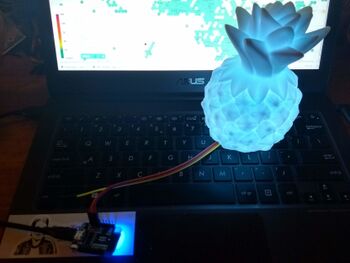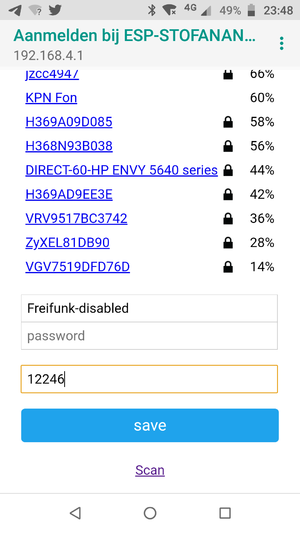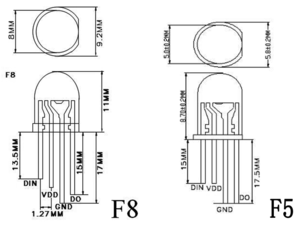StofAnanas: Difference between revisions
m →Usage |
|||
| Line 40: | Line 40: | ||
=== Usage === | === Usage === | ||
* Turn on the light while in range of the WiFi network you configured | * Turn on the light while in range of the WiFi network you configured | ||
* The LED should start yellow (connecting to the WiFi), then briefly change to OFF, then change to | * The LED should start yellow (connecting to the WiFi), then briefly change to OFF (retrieving PM value from Luftdaten), then change to a colour representing a PM concentration | ||
* A new PM measurement is retrieved every minute. | * A new PM measurement is retrieved every minute. | ||
Revision as of 16:11, 18 June 2019
| Project StofAnanas | |
|---|---|

| |
| Showing particulate matter concentration as a coloured light | |
| Status | In progress |
| Contact | bertrik |
| Last Update | 2019-06-18 |
The idea
Show current airborne particulate matter concentration using a LED light in a lamp, inspired by http://stoflamp.nl The data that the LED colour is based on is simply retrieved over WiFi from the luftdaten website.
This lamp is a plastic pine apple ("ananas"), bought at the "Action" store.
Features:
- The lamp shows particulate matter concentration as a colour, from light blue for low concentration and bright pink for high concentration
- The lamp retrieves the PM value over wifi from the the luftdaten website
- The luftdaten measurement station can be entered at the same time as when wifi credentials are entered.
Ideas/nice to have:
- The lamp "breathes" by varying the intensity over time, e.g. a cycle of 10 seconds where the light dims a bit and brightens a bit. Perhaps increase the breathing rate for higher PM.
- Automatic determination of location by means of wifi location
- Remote control over IR
- Use HSV/HSL colour model internally (instead of RGB)
Operation Manual

Programming
- connect everything up as indicated under 'hardware' and connect the Wemos D1 board to the USB port of your development PC / laptop
- flash the software into the Wemos D1 mini, typically from the command line using platformio:
pio run -t upload
Configuration
- on https://netherlands.maps.luftdaten.info find the particulate matter station you want to follow and note the number of the station, for example "12246"
- on a mobile phone, connect to the "ESP-STOFANANAS" network, and select login
- when presented with the captive portal, select a WiFi network, fill in the WiFi password, AND ALSO fill in the number you looked up earlier, press SAVE
- NOTE: when the configuration is ongoing, the LED will be YELLOW, it turns OFF when configuration is done.
Usage
- Turn on the light while in range of the WiFi network you configured
- The LED should start yellow (connecting to the WiFi), then briefly change to OFF (retrieving PM value from Luftdaten), then change to a colour representing a PM concentration
- A new PM measurement is retrieved every minute.
Hardware

The lamp is controlled by an ESP8266, a Wemos D1 mini board. The LEDs is an RGB LED with built-in PL9823 controller.
Connections (using dupont female-female):
- LED Din to Wemos D1 mini pin D3
- LED Gnd to Wemos D1 mini pin GND
- LED Vdd to Wemos D1 mini pin 5V
Software
Software is available on github.
Luftdaten interface
The current measurement value of a particular sensor can be determined by parsing the JSON messages retrieved over a REST interface, by performing an HTTP GET on URL
http://api.luftdaten.info/v1/sensor/<sensor-id>/
where <sensor-id> is the database id used by luftdaten (and visible on their map). The trailing slash in the URL is significant.
For example:
http://api.luftdaten.info/v1/sensor/12246/
The software looks for the "P1" (PM10) sensor value in the JSON message and averages all measurements it finds (usually the current one and a previous one).
Arduino libraries
Libraries:
- WiFiManager is used to manage WiFi connection to the local AP
- ArduinoJSON for the parsing the luftdaten response
- FastLED is used to control the LED